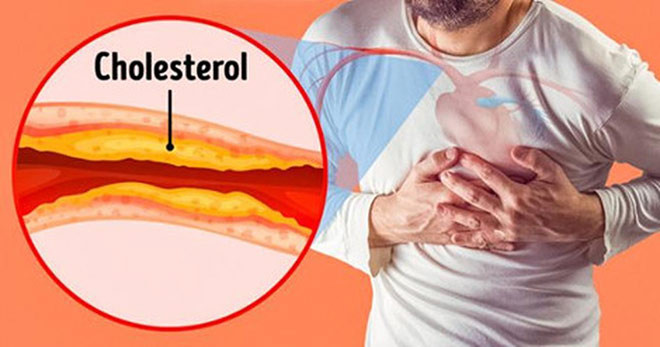When should high blood fat be treated?
According to a survey, on average, 1 in 3 adults have high LDL cholesterol levels, causing high blood fat. So how high is blood fat that needs treatment? The answer will be in the article.
High blood fat is a condition of increased bad cholesterol (low density lipoprotein - LDL) or triglycerides or both in the blood leading to blood vessel blockage and causing serious effects on the heart.
1. What is blood fat?
Blood fat includes two main types: cholesterol and triglycerides.
Cholesterol includes:
- Good cholesterol (high cholesterol), bad cholesterol (low cholesterol)
- Total cholesterol, accounts for a very high proportion (60 - 70%).
Cholesterol is a fat found in the cell membranes of all tissues in the body and is transported in human plasma. Most cholesterol is synthesized by the liver from saturated fats, a small part of cholesterol is absorbed from foods such as: eggs, milk, brain, red meat (beef, dog, goose, goat, lamb), animal fat, pork intestines, beef intestines, shrimp.
The characteristic of cholesterol is that it is poorly soluble in water. It cannot dissolve and move in the blood but must rely on lipoprotein (lipoprotein is a substance synthesized by the liver and soluble in water that carries cholesterol).
Cholesterol is essential for the functioning of cell membranes in the body, and is needed for the body to function to produce hormones.
Good cholesterol (HDL-C) plays a role in making the artery walls soft for better blood circulation and has the ability to protect blood vessel walls, while bad cholesterol (LDL-C) causes atherosclerosis.

2. Causes of high blood fat
There are many causes of high blood fat, including:
– Due to genetic factors, gender and age.
- People who are often stressed, prolonged stress.
- People with obesity and lack of exercise.
– Unreasonable diet, eating foods high in fat, smoking, drinking a lot of alcohol or alcoholic beverages.
– People with certain diseases such as: diabetes, high blood pressure, autoimmune diseases, hypothyroidism, polycystic ovary syndrome.
3. When is it called high blood fat?
Normal total blood cholesterol has an index of <5.2mmol/l. When this index increases above 5.2mmol/l, it begins to be high.
With HDL-C type, the blood index in normal people is ≥ 0.9mmol/l, the higher this index the better.
With LDL-C in normal blood, the index is below 3.4 mmol/l. When this index exceeds 3.4 mmol/l, it is called high...

When blood triglycerides are above 2.26 mmol/l, it is called high triglycerides. When both bad cholesterol and triglycerides increase, it is called mixed hyperlipidemia.
Lipid test is a simple test, performed like a routine blood test. It should be noted that this test requires fasting before blood is drawn.
Fast for at least 6-8 hours beforehand. It is best to do the test in the morning after fasting overnight.
When should high blood fat be treated?
This is a question that many people ask when they have a test result showing high blood fat. Depending on each specific case, doctors will have advice for the patient.
For young people without other risk factors, most doctors will recommend that you change your diet and lifestyle to reduce blood fat, including:
- Need to increase exercise.
- Need to limit saturated fat, especially animal fat, milk tea.
- Need to reduce cholesterol in foods such as egg yolks, butter, shrimp...
- You should eat lots of green vegetables and fruits to supplement fiber, vitamins and minerals.
- Need to lose weight if overweight or obese.
- Do not smoke.
- Limit alcohol consumption.
If after making lifestyle changes (about 2-3 months) your cholesterol levels do not decrease or remain high, your doctor may recommend medication. Statins are the most common drugs used to lower LDL cholesterol and reduce the risk of heart disease. Fibrates and niacin are commonly used to lower triglycerides and increase HDL cholesterol.
The type of medication and dosage will be individualized depending on your blood lipid levels, as well as other risk factors for cardiovascular disease.
In short:When suffering from hyperlipidemia, in addition to taking medication as prescribed by your doctor, a reasonable diet and drinking regimen also plays an important role in bringing blood lipid levels back to normal. In addition, it is necessary to increase physical exercise, control weight, quit smoking and stimulants. Regular medical check-ups at reputable medical facilities to receive advice from doctors and nurses and to order blood lipid tests to prevent high blood lipids.









